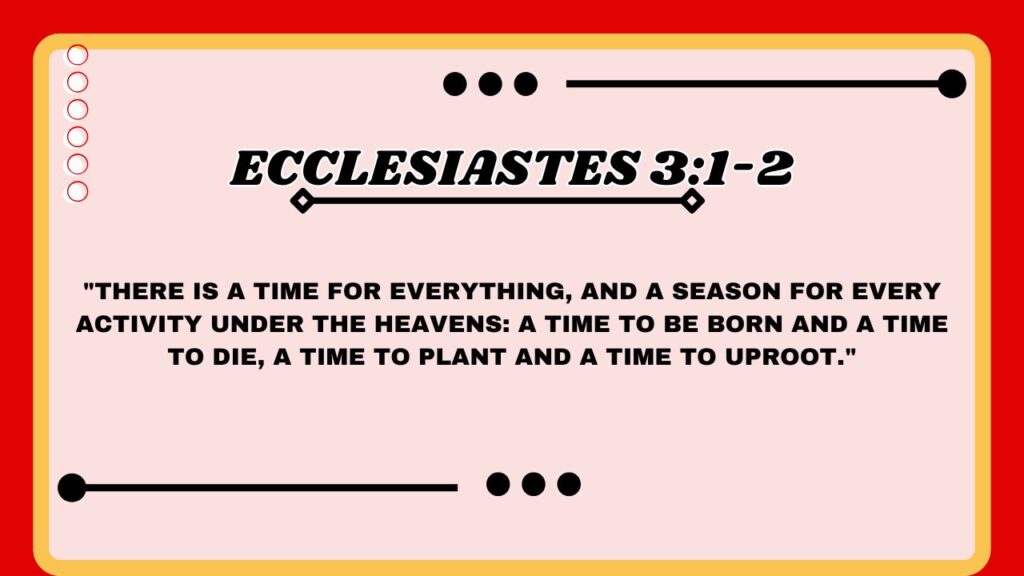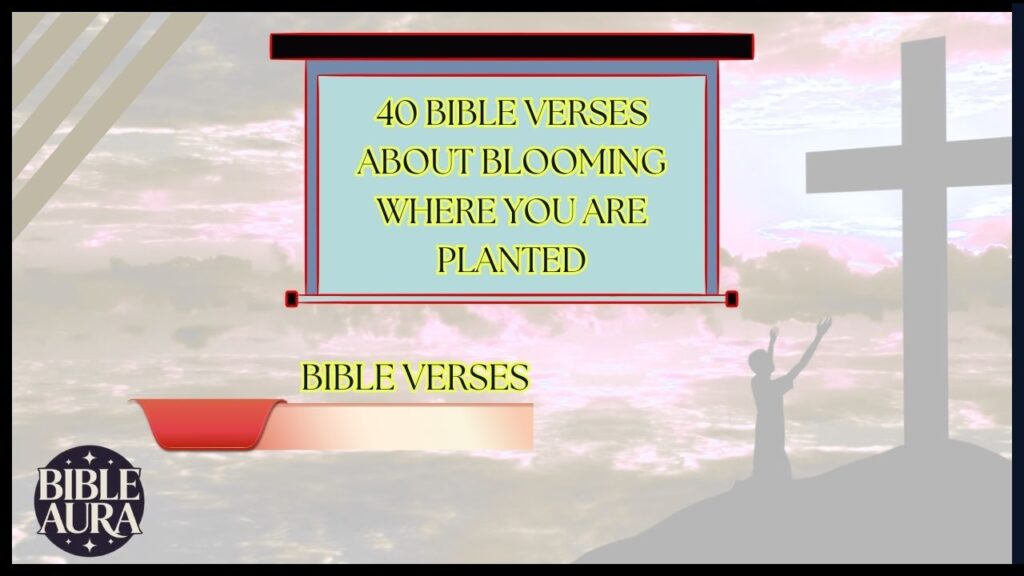Bible Verses About Blooming Where You Are Planted: Life often places us in unexpected soil. Perhaps you’re in a job that wasn’t your first choice, a city you never planned to live in, or a season of waiting that feels endless.
The biblical principle of “blooming where you’re planted” reminds us that God can help us thrive exactly where we are even if it’s not where we expected to be.
Scripture repeatedly shows that our current circumstances are not accidental. God strategically positions us in specific places, relationships, and situations to fulfill His purpose. When we embrace this truth, we can find contentment and bear fruit regardless of our environment.
This biblical perspective isn’t about settling for less. Rather, it’s about recognizing that God’s timeline and placement differ from our preferences, yet His plans ultimately lead to our flourishing. Let’s explore what the Bible teaches about thriving right where you are.
Also Read: 42 Powerful Bible Verses For Baby Dedication
Finding Purpose in Your Current Season
1. Jeremiah 29:4-7
“This is what the LORD Almighty, the God of Israel, says to all those I carried into exile from Jerusalem to Babylon: ‘Build houses and settle down; plant gardens and eat what they produce. Marry and have sons and daughters; find wives for your sons and give your daughters in marriage, so that they too may have sons and daughters. Increase in number there; do not decrease. Also, seek the peace and prosperity of the city to which I have carried you into exile. Pray to the LORD for it, because if it prospers, you too will prosper.'”
God instructed the exiled Israelites to build full lives in Babylon rather than living in perpetual discontent. This teaches us to invest fully where we are, even in unexpected or challenging places. Today, you can choose to engage meaningfully with your current community instead of mentally living elsewhere.
2. Ecclesiastes 3:1-2
“There is a time for everything, and a season for every activity under the heavens: a time to be born and a time to die, a time to plant and a time to uproot.”

Solomon reminds us that life moves in divinely appointed seasons. Understanding your current season helps you align your expectations with reality rather than fighting against it. Consider journaling about what season you’re in and what “blooming” might look like specifically for this time.
3. Genesis 39:2-3
“The LORD was with Joseph so that he prospered, and he lived in the house of his Egyptian master. When his master saw that the LORD was with him and that the LORD gave him success in everything he did.”
Despite being sold into slavery, Joseph thrived through God’s presence with him. This shows how God’s favor isn’t limited by our circumstances. Look for evidence of God working in your current situation, however imperfect it may seem.
4. Romans 8:28
“And we know that in all things God works for the good of those who love him, who have been called according to his purpose.”
Paul assures believers that God is actively working everything including difficult situations toward our ultimate good. This verse invites us to trust God’s bigger picture when we can’t understand our current placement. Ask yourself: “What might God be developing in me through this season?”
5. Psalm 92:13-14
“Planted in the house of the LORD, they will flourish in the courts of our God. They will still bear fruit in old age, they will stay fresh and green.”
The psalmist describes how being “planted” in God’s presence leads to continuous fruitfulness. This teaches that our primary “soil” is relationship with God, not physical location. Prioritize spiritual disciplines that keep you connected to God regardless of your circumstances.
Also Read: 45 Bible Verses About Gossip and Slander (Explained)
Cultivating Contentment Where You Are
6. Philippians 4:11-13
“I am not saying this because I am in need, for I have learned to be content whatever the circumstances. I know what it is to be in need, and I know what it is to have plenty. I have learned the secret of being content in any and every situation, whether well fed or hungry, whether living in plenty or in want. I can do all this through him who gives me strength.”
Paul reveals that contentment is a learned skill, not an automatic response. This shows us that being satisfied where we are is possible through Christ’s strength. Practice gratitude daily by naming three specific blessings in your current situation.
7. 1 Timothy 6:6
“But godliness with contentment is great gain.”
Paul teaches that combining godly character with contentment creates true prosperity. This challenges our tendency to think fulfillment comes from changed circumstances. Evaluate what “great gain” might look like beyond material or circumstantial improvements.
8. Hebrews 13:5
“Keep your lives free from the love of money and be content with what you have, because God has said, ‘Never will I leave you; never will I forsake you.'”

The writer of Hebrews connects contentment with God’s faithful presence. This shows that knowing we’re never abandoned by God provides security in any situation. Remind yourself daily that God’s presence with you is more valuable than ideal circumstances.
9. Luke 16:10
“Whoever can be trusted with very little can also be trusted with much, and whoever is dishonest with very little will also be dishonest with much.”
Jesus teaches that faithfulness in small things precedes larger responsibilities. This principle reminds us that how we handle our current position affects future opportunities. Identify one small responsibility where you can demonstrate exceptional faithfulness this week.
10. Psalm 16:5-6
“LORD, you alone are my portion and my cup; you make my lot secure. The boundary lines have fallen for me in pleasant places; surely I have a delightful inheritance.”
David expresses satisfaction with God’s apportionment for his life. This psalm invites us to see divine goodness in our current boundaries. Try reframing limitations in your life as “boundary lines” that God has established for your protection and direction.
Also Read: 47 Bible Verses About Being Set Apart (Explained)
Bearing Fruit Through Difficulties
11. James 1:2-4
“Consider it pure joy, my brothers and sisters, whenever you face trials of many kinds, because you know that the testing of your faith produces perseverance. Let perseverance finish its work so that you may be mature and complete, not lacking anything.”
James reveals that trials develop spiritual maturity. This perspective transforms challenges from obstacles to opportunities for growth. When facing difficulties, ask: “What quality is this situation developing in me?”
12. Romans 5:3-5
“Not only so, but we also glory in our sufferings, because we know that suffering produces perseverance; perseverance, character; and character, hope. And hope does not put us to shame, because God’s love has been poured out into our hearts through the Holy Spirit, who has been given to us.”
Paul outlines the spiritual growth process that begins with suffering. This shows how challenging circumstances can become stepping stones to developing hope. Create a “growth timeline” noting how past difficulties have ultimately strengthened your character.
13. 2 Corinthians 4:17-18
“For our light and momentary troubles are achieving for us an eternal glory that far outweighs them all. So we fix our eyes not on what is seen, but on what is unseen, since what is seen is temporary, but what is unseen is eternal.”
Paul provides eternal perspective on present difficulties. This helps us endure by understanding the lasting value being created through temporary challenges. Practice looking at your situation through the lens of eternity by asking: “How might this matter 10,000 years from now?”
14. Psalm 1:1-3
“Blessed is the one who does not walk in step with the wicked or stand in the way that sinners take or sit in the company of mockers, but whose delight is in the law of the LORD, and who meditates on his law day and night. That person is like a tree planted by streams of water, which yields its fruit in season and whose leaf does not wither whatever they do prospers.”
The psalmist compares the righteous to trees planted by water. This imagery shows that spiritual nourishment, not circumstantial ease, produces fruitfulness. Identify your “streams of water” consistent sources of spiritual refreshment in your life.
15. John 15:5
“I am the vine; you are the branches. If you remain in me and I in you, you will bear much fruit; apart from me you can do nothing.”
Jesus teaches that fruitfulness comes through connection to Him. This reveals that productivity is not about location but about relationship with Christ. Evaluate whether you’re trying to produce fruit through self-effort rather than through abiding in Christ.
Also Read: 40 Important Bible Verses About Enemies
Growing Through Service and Purpose
16. 1 Corinthians 7:17
“Nevertheless, each person should live as a believer in whatever situation the Lord has assigned to them, just as God has called them. This is the rule I lay down in all the churches.”

Paul instructs believers to live faithfully in their assigned situations. This teaches that God’s call operates within our current circumstances, not despite them. Consider how your faith might be uniquely expressed in your specific workplace, neighborhood, or family situation.
17. Esther 4:14
“For if you remain silent at this time, relief and deliverance for the Jews will arise from another place, but you and your father’s family will perish. And who knows but that you have come to your royal position for such a time as this?”
Mordecai helps Esther recognize divine purpose in her unexpected position. This shows how God often places us strategically for kingdom impact. Reflect on the unique opportunities for influence that exist precisely because of where you are planted.
18. Acts 17:26-27
“From one man he made all the nations, that they should inhabit the whole earth; and he marked out their appointed times in history and the boundaries of their lands. God did this so that they would seek him and perhaps reach out for him and find him, though he is not far from any one of us.”
Luke records Paul’s teaching that God determines where and when people live. This reveals that geographic and historical placement is part of God’s plan for drawing people to Himself. Consider how your location provides unique opportunities to demonstrate God’s reality to others.
19. Colossians 3:23-24
“Whatever you do, work at it with all your heart, as working for the Lord, not for human masters, since you know that you will receive an inheritance from the Lord as a reward. It is the Lord Christ you are serving.”
Paul elevates ordinary work by connecting it to divine service. This transforms even mundane tasks into worship. Choose one routine activity this week and approach it as direct service to Christ rather than merely fulfilling an obligation.
20. 1 Peter 4:10
“Each of you should use whatever gift you have received to serve others, as faithful stewards of God’s grace in its various forms.”
Peter encourages believers to steward their gifts for others’ benefit. This shows that our abilities are meant to bless our current community. Identify one gift you have that could meet a need where you are right now.
Also Read: 51 Bible Verses About Butterflies
Trusting God’s Placement and Timing
21. Isaiah 55:8-9
“‘For my thoughts are not your thoughts, neither are your ways my ways,’ declares the LORD. ‘As the heavens are higher than the earth, so are my ways higher than your ways and my thoughts than your thoughts.'”
Isaiah reminds us of God’s superior wisdom. This helps us trust divine placement even when it doesn’t match our preferences. When questioning your circumstances, practice saying, “God, I trust that Your perspective is higher than mine.”
22. Proverbs 16:9
“In their hearts humans plan their course, but the LORD establishes their steps.”
Solomon acknowledges the interplay between human planning and divine direction. This teaches us to hold our plans loosely while trusting God’s guidance. Before making decisions, pray: “Lord, establish my steps according to Your wisdom, not just my preferences.”
23. Psalm 37:23-24
“The LORD makes firm the steps of the one who delights in him; though he may stumble, he will not fall, for the LORD upholds him with his hand.”

David describes God’s sustaining presence in a believer’s journey. This assures us that God supports us through difficult terrain. Remember that even when you feel unsteady in your current placement, God’s hand is upholding you.
24. Jeremiah 17:7-8
“But blessed is the one who trusts in the LORD, whose confidence is in him. They will be like a tree planted by the water that sends out its roots by the stream. It does not fear when heat comes; its leaves are always green. It has no worries in a year of drought and never fails to bear fruit.”
Jeremiah uses plant imagery to illustrate resilience through trust in God. This shows how deep spiritual roots sustain us through challenging seasons. Examine how you might deepen your “root system” by more fully trusting God with your current situation.
25. Habakkuk 2:3
“For the revelation awaits an appointed time; it speaks of the end and will not prove false. Though it linger, wait for it; it will certainly come and will not delay.”
Habakkuk receives assurance about God’s perfect timing. This encourages patience when fulfillment seems delayed. When tempted to force change, remind yourself that God’s timing is neither too early nor too late, but precisely right.
Also Read: 48 Bible Verses About Retirement (Explained)
Embracing Growth Through Change
26. Isaiah 43:19
“See, I am doing a new thing! Now it springs up; do you not perceive it? I am making a way in the wilderness and streams in the wasteland.”
Isaiah describes God’s ability to create new possibilities in barren places. This invites us to look for divine activity in unlikely circumstances. Practice asking, “What new thing might God be doing in this unexpected situation?”
27. 2 Corinthians 5:17
“Therefore, if anyone is in Christ, the new creation has come: The old has gone, the new is here!”
Paul describes the transformation that occurs through faith in Christ. This shows that spiritual renewal happens regardless of external circumstances. Reflect on how your identity as a new creation might transform your perspective on your current placement.
28. Philippians 1:6
“Being confident of this, that he who began a good work in you will carry it on to completion until the day of Christ Jesus.”
Paul assures believers of God’s commitment to their spiritual development. This reminds us that God is actively working in us even when progress seems slow. Keep a growth journal noting small evidences of God’s ongoing work in your life.
29. Lamentations 3:22-23
“Because of the LORD’s great love we are not consumed, for his compassions never fail. They are new every morning; great is your faithfulness.”
Jeremiah finds hope in God’s daily compassion amid devastation. This teaches us that God provides fresh mercy for each day’s challenges. Begin each morning acknowledging that God’s compassion is available precisely for that day’s difficulties.
30. Isaiah 41:10
“So do not fear, for I am with you; do not be dismayed, for I am your God. I will strengthen you and help you; I will uphold you with my righteous right hand.”

Isaiah records God’s promise of presence and support. This assures us that God provides specific strength for our particular challenges. When feeling inadequate for your current placement, remember that God’s promise isn’t just presence but practical help.
Also Read: 35 Bible Verses About Commitment
Finding Community Where You’re Planted
31. Hebrews 10:24-25
“And let us consider how we may spur one another on toward love and good deeds, not giving up meeting together, as some are in the habit of doing, but encouraging one another and all the more as you see the Day approaching.”
The author emphasizes the importance of spiritual community. This shows how fellowship strengthens our ability to thrive. Identify specific ways you can connect more deeply with believers in your current location.
32. Proverbs 27:17
“As iron sharpens iron, so one person sharpens another.”
Solomon describes how relationships refine character. This teaches that growth often happens through interaction with others. Look for “iron-sharpening” relationships where you are currently planted.
33. Ecclesiastes 4:9-10
“Two are better than one, because they have a good return for their labor: If either of them falls down, one can help the other up. But pity anyone who falls and has no one to help them up.”
Solomon explains the practical benefits of partnership. This reminds us that flourishing often requires supportive relationships. Evaluate whether you’re trying to “bloom” in isolation rather than in community.
34. Galatians 6:2
“Carry each other’s burdens, and in this way you will fulfill the law of Christ.”
Paul instructs believers to share in each other’s struggles. This shows how mutual support fulfills Christ’s command to love. Look for opportunities to help carry someone else’s burden this week.
35. 1 Thessalonians 5:11
“Therefore encourage one another and build each other up, just as in fact you are doing.”
Paul commends the practice of mutual encouragement. This demonstrates how our words can nurture others’ growth. Make a habit of speaking growth-promoting words to those around you.
Also Read: 38 Bible Verses About Anointing (Explained)
Staying Rooted in Faith
36. Colossians 2:6-7
“So then, just as you received Christ Jesus as Lord, continue to live your lives in him, rooted and built up in him, strengthened in the faith as you were taught, and overflowing with thankfulness.”

Paul urges believers to remain firmly established in Christ. This shows that spiritual rootedness precedes visible growth. Evaluate whether your faith is deeply rooted or merely superficial.
37. Ephesians 3:17-19
“So that Christ may dwell in your hearts through faith. And I pray that you, being rooted and established in love, may have power, together with all the Lord’s holy people, to grasp how wide and long and high and deep is the love of Christ, and to know this love that surpasses knowledge that you may be filled to the measure of all the fullness of God.”
Paul prays for believers to be rooted in Christ’s love. This reveals that experiencing God’s love creates stability and fullness. Meditate on the dimensions of Christ’s love as your foundation for thriving.
38. Matthew 13:23
“But the seed falling on good soil refers to someone who hears the word and understands it. This is the one who produces a crop, yielding a hundred, sixty or thirty times what was sown.”
Jesus explains how receptive hearts produce abundant fruit. This teaches that our response to God’s word determines our fruitfulness. Examine how you might create more “good soil” in your heart through reflection and application of scripture.
39. Psalm 1:3
“That person is like a tree planted by streams of water, which yields its fruit in season and whose leaf does not wither whatever they do prospers.”
The psalmist describes the consistent fruitfulness of the righteous. This shows that spiritual hydration leads to lasting productivity. Identify consistent sources of spiritual refreshment that keep you vibrant regardless of circumstances.
40. Psalm 52:8
“But I am like an olive tree flourishing in the house of God; I trust in God’s unfailing love for ever and ever.”

David compares himself to a thriving tree in God’s presence. This image illustrates how divine proximity produces flourishing. Cultivate awareness of God’s presence in your daily routines to experience growth wherever you are.
Also Read: 40 Bible Verses About Clarity (Explained)
Conclusion: Bible Verses About Blooming Where You Are Planted
Scripture consistently reveals that God intentionally places us in specific locations and situations for purposes greater than our immediate comfort. When we trust His wisdom in our placement, we can put down roots, draw nourishment from His presence, and bear fruit that might not have been possible elsewhere.
Blooming where you’re planted doesn’t mean passive resignation to difficult circumstances. Rather, it means actively engaging with your current reality while trusting God’s sovereignty. It means finding purpose in unexpected places, contentment in imperfect situations, and opportunities for growth in challenging soil.
Remember that God’s primary concern is not your location but your spiritual condition. As you cultivate faithfulness in your present circumstances however temporary or permanent they may be ou’ll discover the joy of bearing fruit exactly where God has placed you.
Bonus: Practical Ways to Use These Verses
- Morning Meditation: Select one verse each week for daily reflection. Write it on a notecard and place it where you’ll see it first thing in the morning.
- Scripture Journaling: Create a “Blooming Journal” where you write out these verses and record how God is helping you thrive in your current situation.
- Prayer Focus: Use these verses as prayer prompts, asking God to help you develop the specific quality each verse highlights.
- Environmental Reminders: Create simple artwork featuring 2-3 key verses and place them strategically in areas where you struggle most with contentment.
- Accountability Partnership: Share these verses with a friend and check in weekly about how you’re applying them to your current challenges.
- Memory Work: Commit 3-5 of these verses to memory so they’re available when discouragement strikes.
- Gratitude Practice: Use these verses to inspire a daily gratitude list focusing on unexpected blessings in your current placement.
- Mentoring Resource: Share these verses with someone younger who is struggling with their circumstances.
Frequently Asked Questions
Does “blooming where you’re planted” mean I should never pursue change?
No. Scripture encourages faithful presence where you are now, but also shows many examples of God-directed transitions. The key is discerning whether dissatisfaction stems from resistance to God’s current placement or genuine divine leading toward something new.
How can I know if I’m where God wants me?
While Scripture doesn’t provide a universal formula, indicators include: peace despite challenges, confirmation through wise counsel, alignment with biblical principles, and opportunities to use your gifts. Remember that God often speaks through your circumstances, community, conscience, and His Word.
What if my situation feels like a punishment rather than an opportunity?
Even difficult circumstances can serve divine purposes. Joseph’s slavery and imprisonment prepared him for leadership. Daniel’s captivity positioned him for influence. Present hardship doesn’t indicate divine abandonment but may be preparation for future fruitfulness.
How long should I expect to stay “planted” in a difficult situation?
Scripture doesn’t promise specific timeframes but teaches patient endurance while remaining sensitive to God’s direction. Some seasons are brief preparation periods; others are long-term assignments. Focus on faithfulness in the present while remaining open to God’s guidance about timing.
What if I feel completely withered in my current environment?
If you’re spiritually depleted, prioritize reconnection with God through basic spiritual disciplines. Sometimes we need to find new sources of nourishment within our current situation perhaps through different spiritual practices, supportive relationships, or perspective shifts that help us access God’s presence more consistently.
Read more knowledgeable blogs on Bible Aura

Piper McMillan is a passionate writer and educator dedicated to sharing the beauty and depth of the Bible. As the author behind the Piper McMillan website, she explores Bible verses, unlocks biblical narratives, and provides insights for living a Christ-centered life. Through warm, approachable, and inspiring articles, Piper guides readers to deepen their understanding of Scripture and apply its timeless wisdom to daily living. Her mission is to uplift, educate, and help others walk faithfully with God, rooted in His word.



